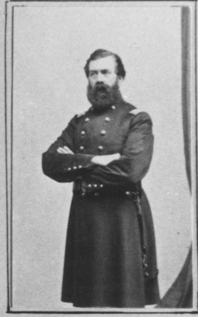At the dedication of the 13th Mass Monument at Gettysburg, in Sept., 1885, Lieutenant A. N. Samson, Chariman of the monument committee called upon Charles E. Davis, Jr., of Company B, to read the poem written expressly for the occasion by Rev. M. J. Savage.
THE COLOR-BEARER SPEAKS.
"I stand here now, as once before,
All Granite to the battle's shock,
As on some billow-beaten shore
Fronts every storm the seaward rock.
"Is this the field that on that day
Hissed hot with shot, and heard the yell
How! northward through the smoky fray,
Where men were fiends, and earth was hell?
"And now the sun smiles, and the tread
Of marching years has left no trace
Of that day, save - where sleep the dead -
These mounds that love would not efface.
"But yet I see it all again -
The frenzied battle's formless form,
The reeling field alive with men,
The thunderous flashes through the storm!
"The rifles' crack, the hiss, the thud;
The sizz of the on-hurtling shell;
The dying cry; the trickling blood -
The sights, the sounds we know too well -
"They all come back! I hear! I see!
O God! What is it that can make
Men mad with such fierce revelry?
We faced it for our country's sake.
"See, boys! "Twas here our twin corps stood -
The Eleventh and the First - that day,
And what such brave men only could,
Held half the rebel force at bay.
"For six dread hours, with bated breath,
Ten thousand forty thousand face!
And each had paid the price of death
To save a safe defeat's disgrace.
"Tis easy in the battle's wrath
To lead the charge when foemen run;
But, in the rifle's deadly path
With empty cartidge-box and gun,
"To stand a firm unyielding wall
Of bodies brave enough to bleed,
And close the gaps where dead men fall, -
This, this is heroes' work indeed!
"And such a deed our heroes wrought!
Theirs not a fleeting courage, born
Of battle-anger: our boys fought
As they who life and love can scorn.
"How grandly fighting Reynolds fell!
How bravely Paul stood through the fight!
Which loss was greater, who can tell?
Paul lives, but walks the earth in night.*
"But grandest end of all find I!
My hand the shot-torn flag still holds!
'Tis easy, while it flies, to die!
'Tis my proud blood that stains its folds!
"And when our boys fall back at last,
Of all our regiment remain
To tell the story of the past
Scarce one brave hundred from the slain!
"Such is the price with which we bought
A country. And our sons here see
How faithfully the fathers wrought
For manhood, peace, and liberty.
"And you, ye sons, as here you tread,
And on our graves your tributes lay,
That ye be worthy of such dead
That ye be worthy of such dead
Forget not till the latest day!"
Last summer, a descendant of a 13th Mass soldier shared with me over 70 high resolution scans of photographs that had been labeled and saved in his ancestor's scrapbook. Among them was a portrait of Roland B. Morris, the color bearer, killed July 1st 1863, on the spot of the regiment's monument at the Battle of Gettysburg. The sculpture was done in his likeness - BF
*Brigade Commander Gabriel R. Paul was shot through both eyes but lived.



























